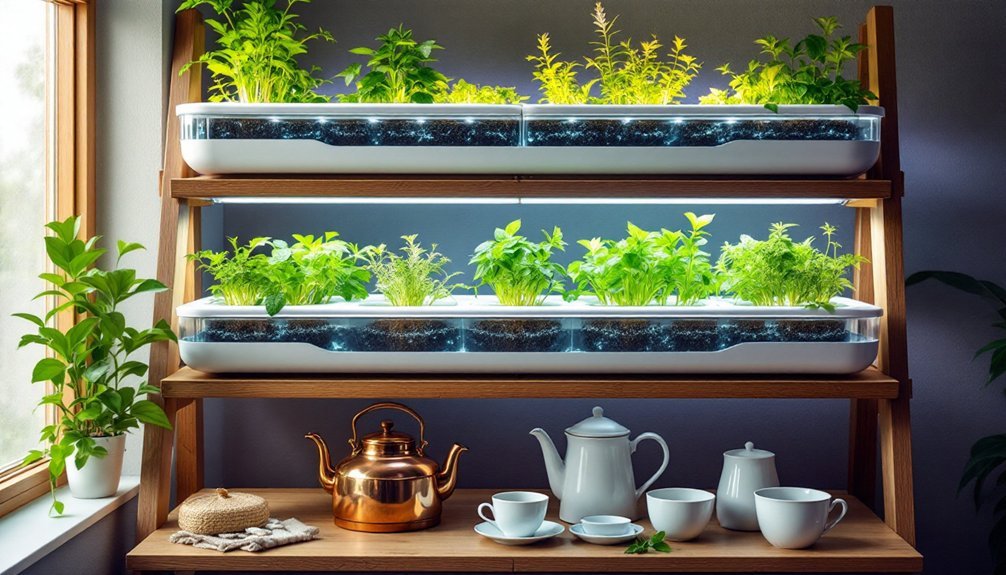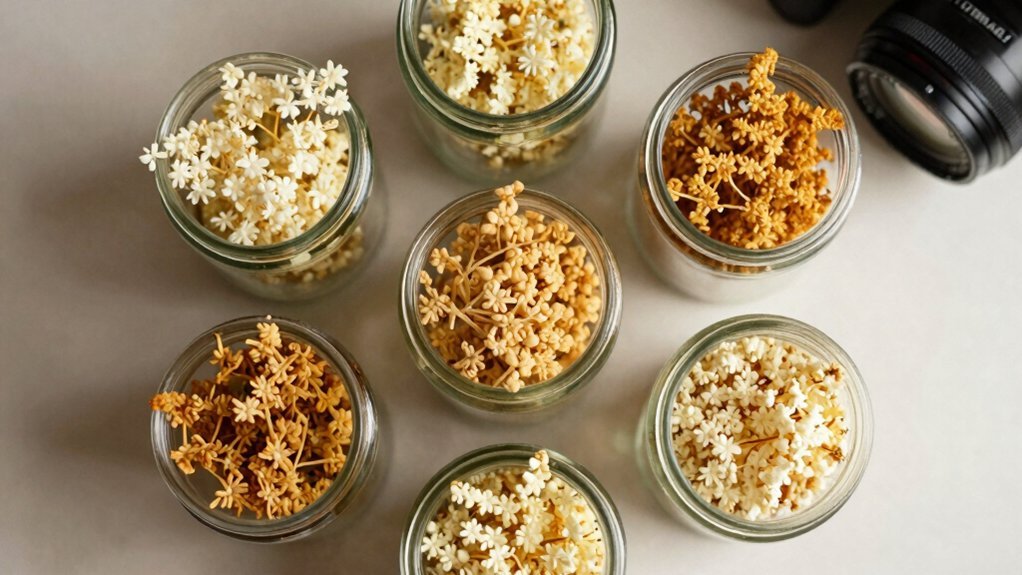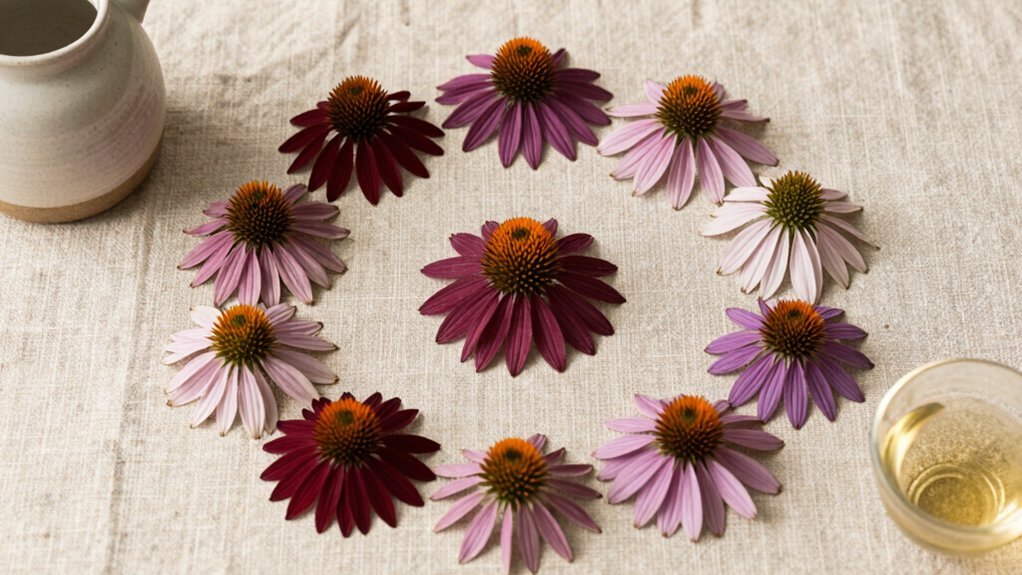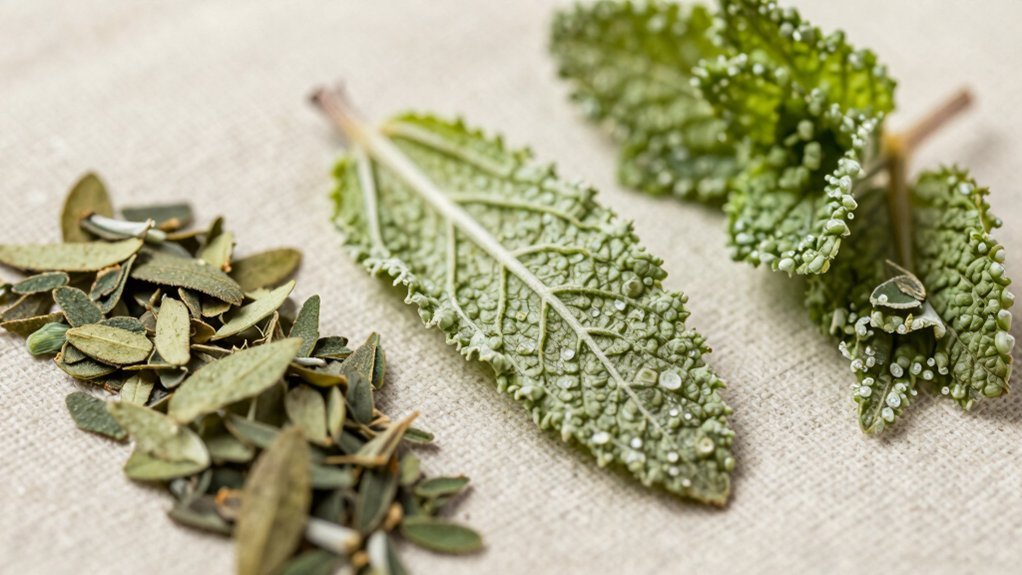If you're passionate about crafting your own herbal teas, you'll appreciate the convenience and satisfaction of growing your ingredients at home. Today's indoor herb growing kits make it easier than ever to cultivate essential tea varieties like chamomile, mint, and lavender right on your windowsill. But not all kits are created equal – some offer superior germination rates, better growing materials, and more thorough support. Let's explore the top five options that'll transform your tea-making experience.
Indoor Herb Garden Seed Starter Kit for Medicinal Herbs
Tea enthusiasts seeking a thorough introduction to medicinal herb gardening will find everything they need in this Indoor Herb Garden Seed Starter Kit. You'll receive non-GMO seeds for Mint, Chamomile, Lemon Balm, and Lavender, along with burlap grow bags, soil disks, and bamboo markers in a lined wooden planter box.
While the kit offers extensive support through expert gardeners, instructional videos, and an online community, you should note mixed customer experiences. Some users love the quality materials, but others report germination issues and mold problems. The USA-grown seeds come from a veteran-owned business committed to sustainability, making this kit suitable for windowsills, countertops, or balcony gardens.
Best For: Tea lovers and aspiring herbalists who want to grow their own medicinal herbs indoors with comprehensive growing support and high-quality materials.
Pros:
- Complete starter kit with everything needed including quality non-GMO seeds, grow bags, and planter box
- Extensive growing support through expert gardeners, instructional videos, and online community
- Sustainable and USA-grown products from a veteran-owned business
Cons:
- Mixed customer experiences with seed germination rates
- Reports of mold issues with soil disks
- Slow response times for replacement requests and customer service issues
Tea Growing Kit with 5 Medicinal Herb Seeds
Whether you're a tea enthusiast or aspiring herbalist, this complete growing kit provides everything needed to cultivate five medicinal herbs right from your windowsill. You'll receive premium heirloom seeds for Lavender, Chamomile, Lemon Balm, Peppermint, and Echinacea – all 100% Non-GMO and USA-grown.
The kit includes eight biodegradable soil disks, reusable pots, and plant markers, making it perfect for both indoor and outdoor growing. Each seed packet comes with detailed planting instructions, ensuring success for beginners and experts alike. Most seeds germinate within expected timeframes, producing aromatic herbs ideal for fresh teas. It's a thoughtful gift for gardeners and tea lovers, though you'll want to plan for early transplanting as seedlings grow.
Best For: Tea enthusiasts, beginner gardeners, and anyone interested in growing their own medicinal herbs at home for fresh herbal teas.
Pros:
- Complete all-in-one kit with high-quality non-GMO seeds, soil disks, pots, and clear instructions
- Variety of popular medicinal herbs perfect for making fresh teas and aromatherapy
- Makes an excellent gift with educational value and long-term enjoyment potential
Cons:
- Small starter pots require early transplanting as seedlings grow
- Germination times may vary and require patience
- Some herbs like Lavender may take longer to mature compared to others
9 Herb Indoor Window Garden Kit – Complete Herb Plant Growing Set
Plant enthusiasts seeking an all-encompassing herb-growing solution will find everything they need in the PLANTMEW 9 Herb Indoor Window Garden Kit. You'll receive nine varieties of organic, non-GMO herb seeds, including basil, mint, and rosemary, along with nutrient soil and essential growing tools.
This USA-made kit fits perfectly on your windowsill, measuring just 10 x 4.8 x 4 inches. You can grow these herbs indoors or outdoors, making it versatile for any space. While you might need extra soil, the high-germination seeds and expert guidance guarantee your success. It's an ideal gift for tea lovers and home gardeners who want to experience the therapeutic benefits of growing their own herbs.
Best For: Home cooks and gardening beginners looking to grow fresh organic herbs indoors with a complete, easy-to-use starter kit.
Pros:
- Complete all-in-one kit with 9 different herb varieties and essential growing supplies
- High-quality organic, non-GMO seeds with superior germination rates
- Compact size perfect for windowsills and small spaces with indoor/outdoor versatility
Cons:
- Insufficient soil included – requires purchasing additional potting mix
- Some herbs like rosemary and sage may be challenging for complete beginners
- Limited growing space in provided containers for mature herbs
Indoor Herb Garden Starter Kit (10 Variety Herbs)
Growing your own herbal tea garden becomes effortless with this extensive 10-variety starter kit. You'll receive non-GMO seeds for lavender, mint, sage, and seven other popular herbs, along with reusable pots and nutrient-rich soil discs.
What sets this kit apart is its soil meter that measures moisture, pH, and light levels, ensuring excellent growing conditions. The clear instruction booklet guides you through every step, whether you're a novice or experienced gardener. While most users report successful herb growth, some have faced challenges. It's an ideal choice for windowsills, balconies, or patios, making fresh herbs readily available for your tea-making adventures.
Best For: Home gardeners, tea enthusiasts, and cooking hobbyists who want to grow their own fresh herbs indoors or on small outdoor spaces like windowsills and balconies.
Pros:
- Complete starter kit with everything needed including soil meter, pots, and nutrient-rich soil discs
- Educational value with clear instructions making it suitable for both beginners and experienced gardeners
- Versatile selection of 10 popular herb varieties that can be used for both cooking and tea-making
Cons:
- Some users report difficulties with herb growth and germination
- Plastic pots may not be as aesthetically pleasing as ceramic alternatives
- Success requires consistent monitoring and maintenance of growing conditions
Indoor Herb Growing Kit for Lavender, Chamomile & Mint Tea Plants
Tea enthusiasts seeking a hands-on brewing experience will love this extensive indoor herb growing kit that includes lavender, chamomile, and mint seeds. You'll receive three charming wooden planters with drip trays and chalkboard labels, plus nutrient-rich expandable soil pellets and detailed instructions.
While beginners can easily follow the step-by-step guide, you'll want to note mixed customer experiences. The kit ranks #2,296 in Herb Plants & Seeds with a 3.1-star rating. Don't worry about unsuccessful germination, though – the company offers a growth guarantee with replacements or refunds if your seeds don't sprout. The reusable planters add a decorative touch to your kitchen while producing fresh herbs for your tea.
Best For: Tea enthusiasts and beginner gardeners who want to grow their own fresh herbs for brewing while adding decorative elements to their indoor space.
Pros:
- Complete starter kit with everything needed including planters, soil pellets, and seeds
- Decorative wooden planters with chalkboard labels add aesthetic value
- Growth guarantee with replacement/refund policy ensures customer satisfaction
Cons:
- Mixed reviews regarding seed germination success rates
- Lower overall customer rating (3.1/5 stars) suggests inconsistent quality
- Some customers report planters being smaller than expected
Factors to Consider When Choosing an Indoor Herb Growing Kit for Tea Makers Enthusiasts
When you're selecting an indoor herb growing kit for making tea, you'll need to evaluate key factors like seed quality, growing space, and soil composition to guarantee successful cultivation. You'll want to check that the planter's design features proper drainage and adequate room for root development, while also fitting comfortably in your available space. The kit should include detailed growing instructions and ongoing support resources to help you nurture your tea herbs from seedling to harvest.
Seed Quality and Variety
Selecting the right seeds stands as the cornerstone of a successful indoor herb garden for tea enthusiasts. You'll want to focus on premium heirloom seeds that are 100% non-GMO and open-pollinated, ensuring your herbs can be sustainably grown season after season.
When choosing your kit, look for options that feature diverse tea-friendly herbs like Lavender, Chamomile, Lemon Balm, and Mint. These varieties won't just provide different flavors and aromas; they'll allow you to create unique, personalized tea blends. Make sure your kit includes seeds that have been tested for high germination rates, as this directly impacts your growing success. You'll also benefit from kits that provide detailed planting guides specific to each herb variety, helping you understand the unique growing requirements of your chosen plants.
Growing Space Requirements
Before investing in an indoor herb growing kit, you'll need to carefully assess your available space to guarantee successful cultivation of your tea herbs. Consider both horizontal and vertical dimensions, as some kits offer stackable options that maximize limited floor space.
Evaluate your growing area's natural lighting conditions, as many tea herbs require specific amounts of sunlight to thrive. If you're working with a windowsill, opt for compact kits with smaller containers that won't overcrowd the space. For larger areas, you can choose systems that accommodate multiple plants simultaneously.
Don't forget to check if your chosen location provides suitable temperature and humidity levels for herb growth. Some spaces may need additional environmental controls to maintain ideal growing conditions, especially if you're planning to grow more sensitive tea herbs.
Soil and Nutrient Content
The quality of soil and nutrient content in your indoor herb growing kit directly impacts the flavor profile and potency of your tea herbs. When selecting a kit, you'll want to look for nutrient-enriched soil that promotes strong root development and healthy plant growth. Many premium kits include specialized soil disks that expand with water, providing ideal moisture levels and nutrient retention for your herbs.
Pay attention to the soil quantity provided in relation to your pot sizes and seed count. You don't want to run short on soil when transplanting or upgrading containers. Consider choosing kits with organic soil options, as they often yield higher germination rates and superior plant health. Remember that the soil's nutrient composition will influence your herbs' final taste and therapeutic properties in your teas.
Planter Design Features
Proper soil preparation sets the foundation, but a well-designed planter determines your herb garden's long-term success. You'll want to prioritize planters with built-in drip trays that prevent root rot and guarantee proper drainage for your tea herbs.
Choose durable, biodegradable planters that'll last through multiple growing seasons while staying eco-friendly. If you're working with limited space, mini planters are perfect for windowsills or small countertops, letting you maximize your growing area. Look for designs that provide adequate depth for root development – this is vital for healthy herb growth.
For easier organization, select planters with chalkboard labels or customizable markers. You'll appreciate this feature when growing multiple tea herbs simultaneously, especially when distinguishing between similar-looking varieties like different mint species.
Support and Instructions
Successful herb growing starts with extensive support and clear instructions from your kit manufacturer. You'll want to choose a kit that provides thorough growing guides, including detailed soil preparation, lighting requirements, and watering schedules specific to tea herbs.
Look for kits that offer multimedia support through instructional videos and access to expert gardening communities. A user-friendly manual should explain essential care requirements, while responsive customer service guarantees you'll get help when needed. Today's leading kits often include digital support through Grower Help Bots, providing instant answers to your cultivation questions.
When evaluating different options, prioritize kits that offer ongoing support throughout your growing journey. This backing gives you confidence as you nurture your herbs from seedling to harvest, especially if you're new to indoor gardening.
Tea-Specific Herb Selection
Selecting herbs specifically cultivated for tea-making forms the cornerstone of a successful indoor growing experience. You'll want to focus on classic tea herbs like Chamomile, Lavender, Lemon Balm, and Mint, which are known for their aromatic qualities and therapeutic benefits.
When choosing your kit, verify it includes heirloom and non-GMO seeds. These varieties not only guarantee better quality tea but also allow you to harvest and replant seeds season after season. Your kit should contain nutrient-rich soil or soil disks specifically formulated for tea herbs, as this directly affects the potency and flavor of your brews. Look for options that provide detailed growing instructions for each herb variety, since they'll have different germination periods and care needs. This targeted approach will help you create a thriving indoor tea garden.
Germination Success Rate
Understanding germination success rates helps you predict how many of your tea herbs will actually sprout and thrive. When selecting a growing kit, look for those featuring heirloom seeds with germination rates of 80-90% or higher, as these offer the best chances of success for your tea garden.
You'll want to pay attention to kits that provide extensive growing instructions and maintain ideal conditions for seed development. The right combination of soil quality, moisture, and temperature greatly impacts your herbs' survival rate. Before making your purchase, check customer reviews specifically mentioning germination success – this real-world feedback can reveal whether a kit consistently delivers on its promises. If you're new to indoor herb growing, choose kits that offer detailed support to help you manage these critical factors effectively.
Kit Durability Materials
The foundation of any reliable herb growing kit lies in its material composition and construction quality. When selecting your kit, you'll want to focus on durable materials that can withstand multiple growing cycles. Look for high-quality plastic or wooden planters that come with built-in drip trays to prevent water damage and extend the life of your setup.
Choose kits featuring reusable components, as they'll save you money and reduce waste over time. Premium soil disks and nutrient-enriched pellets aren't just better for your herbs – they also help maintain the integrity of your growing system. When examining potential kits, pay attention to the quality of included seed packets, preferably heirloom or non-GMO varieties, as they'll contribute to better germination rates and a more sustainable growing experience.
Frequently Asked Questions
Can I Reuse the Growing Kit Containers for Different Herbs Later?
You can reuse growing kit containers for different herbs as long as you thoroughly clean them, sterilize with diluted bleach, and guarantee proper drainage. Just remember to label your new plantings accurately.
How Long Do Indoor-Grown Tea Herbs Maintain Their Flavor After Harvesting?
You'll get the best flavor from your harvested tea herbs within 1-2 weeks when stored properly. If you dry them, they'll maintain good taste for 6-12 months in an airtight container away from light.
What's the Optimal Room Temperature for Growing Multiple Tea Herbs Together?
You'll want to maintain your indoor tea herbs at 65-75°F (18-24°C). Most common tea herbs like mint, chamomile, and lemon balm thrive at this range, though you should monitor each plant's specific needs.
Will Artificial Lighting Affect the Medicinal Properties of My Herbs?
You won't lose medicinal properties with proper artificial lighting. In fact, LED grow lights can help your herbs develop their beneficial compounds effectively, as long as you're providing the right light spectrum and duration.
Can I Mix Different Herb Seeds in the Same Growing Container?
While you can mix herbs in one container, it's not ideal as different plants have varying water, light, and nutrient needs. You'll get better results growing them separately to meet their specific requirements.





Leave a Reply